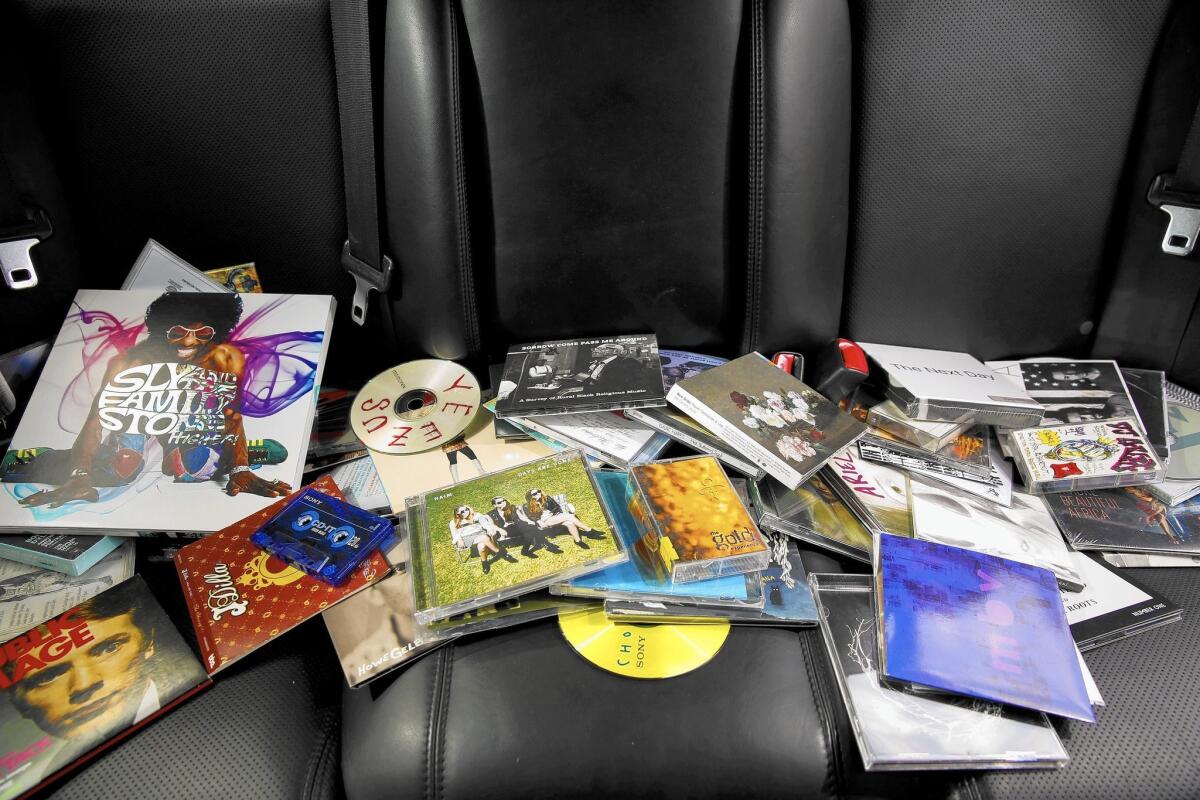Columbia House — 12 albums for a penny! — files for bankruptcy

- Share via
Before there was iTunes, before there was Spotify — heck, even before Al Gore rolled up his sleeves and invented the Internet — there was Columbia House.
The company defined mail-order music for generations of shoppers and pioneered some of the most obnoxious, misleading and hard-to-remedy marketing tactics ever inflicted on consumers.
And now Columbia House, bless its evil little heart, is bankrupt.
The owner of the company, Filmed Entertainment Inc., filed for Chapter 11 Bankruptcy Court protection from creditors Monday, saying it saw little hope of making a buck selling CDs and DVDs in an increasingly digital world.
Anyone who wants to buy the remains of Columbia House can have them, the company said. Probably cheap.
Glenn Langberg, a director on Filmed Entertainment’s board, said in court papers that the company’s revenue peaked in 1996 at roughly $1.4 billion. It’s been downhill ever since, hitting just $17 million last year.
SIGN UP for the free California Inc. business newsletter >>
“This decline is directly attributable to a confluence of market factors that substantially altered the manner in which consumers purchase and listen to music, as well as the way consumers purchase and watch movies and television series at home,” Langberg said.
There will be some who will smile with nostalgia at the mention of Columbia House. It’s hard to forget the ubiquitous ads and mailers offering eight or 10 or a dozen albums for a penny.
A Verge writer said the ad, with its catalog of albums and artists, made him feel “like I was Ralphie in ‘A Christmas Story,’ entranced by the potential and wonder.”
I can relate. I too saw Columbia House’s come-ons and thought, “Wow! Twelve albums for a penny!” And I sent in my list of desired records.
This was the 1970s, so you can assume the likes of Yes, Deep Purple, and Emerson, Lake and Palmer were well represented.
My records arrived as promised, and then down, down, down I went into the Columbia House rabbit hole as unwanted records continued arriving every few weeks. The onus was on me to pay for them or return them.
This, in case you’re wondering, is what’s known in the marketing world as “negative option billing.” That means the customer agrees to keep paying for something until he or she fulfills the terms of the deal and can call it quits.
“Negative option marketing can pose serious financial risks to consumers if appropriate disclosures are not made and consumers are billed for goods or services without their consent,” the Federal Trade Commission said in a 2009 report.
It took me a long time to buy the requisite number of full-priced albums needed to cancel my membership. I remember how frightened I was of the consequences of being beholden to these people forever. I was 15 years old; what do you want?
Nostalgia? For Columbia House? Not me, bub.
According to the bankruptcy filing, the company’s parent has total assets worth $1 million to $10 million, and total liabilities of $50 million to $100 million. More than 250 creditors are lined up outside the door.
Filmed Entertainment is itself owned by New York’s Pride Tree Holdings, which has not filed for bankruptcy protection.
We’ve met Pride Tree before. I wrote last year about Pride Tree’s Quality Paperback Book Club, which, like Columbia House, keeps sending you books while making it needlessly difficult to sever ties.
I noted at the time that Pride Tree seemed to have gone out of its way to prevent people from contacting the company or even knowing anything about its operations, which is a little weird for a firm whose businesses depend on long-term relationships with customers.
It’s ironic that Columbia House wasn’t brought low by its sleazy business practices but rather by changing technology.
Duping people into joining programs that end up being costly and complicated over the long run is unethical. But Columbia House’s downfall came solely because it’s easier and cheaper to buy music and movies online.
It would be nice to think that negative option billing would similarly go away. But, thanks in part to the onetime success of Columbia House, the practice has made the leap to the digital realm.
Think of the times you’ve spotted unexpected charges on your wireless bill — $9.99, say, for a ring-tone or text-message service you couldn’t recall signing up for.
That’s the legacy of Columbia House, which showed marketers that you don’t have to sell a decent product in an honest fashion to make a lot of money. You just have to pull a fast one on consumers and hope they don’t notice — or make it really tough for them to extricate themselves from the situation.
Twelve albums for a penny.
What was I thinking?
David Lazarus’ column runs Tuesdays and Fridays. He also can be seen daily on KTLA-TV Channel 5 and followed on Twitter @Davidlaz. Send your tips or feedback to david.lazarus@latimes.com.
MORE FROM LAZARUS:
Millionaire CEOs should support a living wage for fast-food workers
Anthem’s good intentions get lost in aggressive telemarketing
Cutting the cable cord and embracing a digital media world
More to Read
Inside the business of entertainment
The Wide Shot brings you news, analysis and insights on everything from streaming wars to production — and what it all means for the future.
You may occasionally receive promotional content from the Los Angeles Times.











